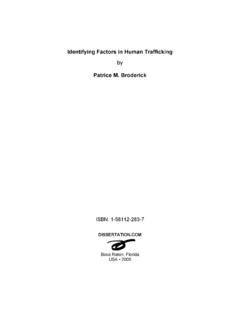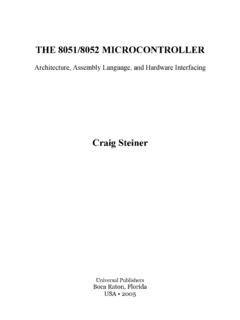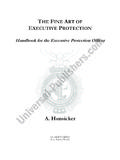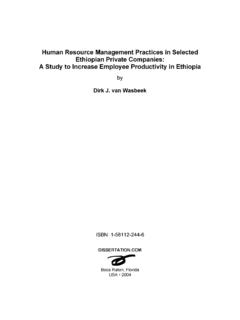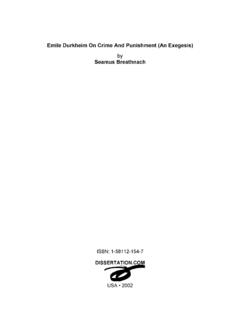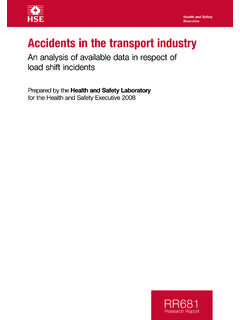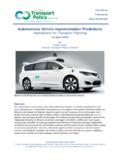Transcription of Introduction to Transport Economics - Official Site
1 Introduction TO Transport Economics Introduction TO Transport Economics DEMAND, COST, PRICING, AND ADOPTION DAVID J. SPURLING Universal-Publishers Boca Raton Introduction to Transport Economics : Demand, Cost, Pricing, and Adoption Copyright David J. Spurling All rights reserved. No part of this book may be reproduced or transmitted in any form or by any means, electronic or mechanical, including photocopying, recording, or by any information storage and retrieval system, with-out written permission from the publisher Universal-Publishers Boca Raton, Florida USA ISBN- : ISBN- : Spurling, David J., - Introduction to Transport Economics : demand, cost, pricing, and adoption / David J.
2 Spurling. p. cm. Includes index. ISBN- : - - - - (pbk. : alk. paper) ISBN- : - - - (pbk. : alk. paper) . Transportation.. Transportation--Costs.. Transportation--Finance. I. Title. HE .S . --dc TABLE OF CONTENTS Introduction : The Importance of Transport Economics .. Demand for Passenger Transport .. Demand for Freight Transport .. Cost Structures .. Forms of Competition .. Pricing Policy .. Reasons for Government Intervention .. Road Passenger Transport , Buses, Coaches, and Taxis .. The Way .. Shipping, Ports and Inland Waterways .. Airports .. Aviation .. Safety .. Coordination of Transport .
3 The Public Sector .. Cost-Benefit Analysis .. Local Authorities and Transport .. Measures of Efficiency .. Transport Investment .. Economies of Scale .. Problems of the Peak .. Rural Transport .. International Transport .. Developing Countries .. The Future of Transport by Mode .. Glossary of Transport Economics Terms .. Transport Economics Questions and Answers .. Index .. ACKNOWLEDGMENTS I would like to thank my son John Spurling for his work in checking the book and suggesting ideas, especially about land use planning. I would also like to extend thanks to Christopher Bird for his sugges-tions about the railways and to James Gachihi for his help in the chapter on developing countries.
4 I would additionally like to thank Christie Mayer for her work in editing the book, although any faults that remain are my responsibility. Thanks are also due to Sophie Martin and Tammy Maines for their audio typing work. CHAPTER Introduction : THE IMPORTANCE OF Transport Economics In this book you will learn how to apply economic principles to Transport . This will not only help you if you are taking examinations, but will also help you if you wish to study the subject for its own sake or if you are in the Transport industry and wish to improve your knowledge of the subject. Transport is an important subject since motoring alone accounted for about % of the household expenditure in the UK in - (source.)
5 Transport Trends). It is an even greater percentage for many total costs of production. It will be a very large part of the total cost for aggregates but a smaller part for the production of high value, low bulk items. Transport Economics matters since we are dealing with a major sector of the economy, not just in the UK, but also in most countries. Finance and the General Economy Like any other branch of Economics , it deals with the allocation of scarce resources. The scarce resources may be vast such as the capital required for the major projects in schemes like the Channel Tunnel, where over billion was spent before its opening in . On the other hand, the finance could be quite small ( , with many road haulage firms operating a single van using family as drivers and also as part-time bookkeepers).
6 Introduction TO Transport Economics Employment and the Transport industry Let s consider the amount of labour used by Transport . At one point before the Second World War, the LMS (London Midland Scottish Railway) was the largest employer in the UK. Employment patterns have changed, but at the present time the Transport sector is a major employer in the UK, particularly in the road haulage sector. The wages paid may also be important. Similarly, air Transport or airport wages can affect many people, as those who have been affected by airline strikes or stoppages can testify. At one stage, the ports were a major source of employment in many areas as old pictures of these areas portray.
7 Whilst the ports are still important, they employ far less labour given the availability of roll-on/roll-off ferries where the vehicles drive straight on to the ships, containerisation, palletisation, and many forms of mechanisation, thereby replacing a vast numbers of workers. Land and the Transport industry The land required may be considerable in the Transport industry as seen in Los Angeles, for example, where it has been estimated that about % of the land space is used for vehicles (both roads and parking). In York in the th century, the railway occupied about % of the land for the passenger station as well as freight lines and sidings. Landowners in the th century often resisted the efforts of the railway companies to go through their land.
8 This not only altered the location of the railways, but also modified the total costs of the original railways. Even today this still affects some of the variable costs as well as demand. Modern airports are often massive and the problem of land is one that arouses great passions, although this is nothing new. The proposed third runway for Heathrow announced in November aroused such a controversy. The problem of land allocation for Transport purposes is still a major problem. This may occur on a large scale, such as considering whether additional runways or terminals should be allocated for airports. After all, once built it is difficult to find alternative sites. It may occur in relatively small bits of land, which cumulatively will add to a considerable amount of land.
9 For example, planning regulations usually specify that houses have to have garages, although the evi-dence is that in a large number of cases, the garages are not used for their original purpose. Therefore, we are using a large amount of land inefficiently. In urban areas, complaints about land allocation IMPORTANCE OF Transport Economics for the purpose of new housing are common, but the land is more often used for the provision of roads rather than for the houses themselves. The ports by definition may be limited in where they can be lo-cated, but are important decisions as they immediately become sunk costs nevertheless as many of these cases cannot easily be reversed. The problems of land allocation (such as trying to preserve railway trackbeds in case they can be used in the future or for roads) have not been satisfactorily resolved.
10 The pricing policy for land, and particularly for parking, is one that causes a great number of prob-lems. How we allocate land for roads in general and whether we need toll roads, congestion charges and so on are also of concern. Fuel and the Transport industry The amount of fuel required by the Transport industry has been a problem for many non-oil producing countries, particularly since the increase in the price of oil from OPEC in and following the Iranian revolution in . This has led many people to specu-late on how far we can move away from fossil fuels. Even in the USA, former President George Bush Junior has talked about the need for Americans to move away from their dependence on for-eign oil.

